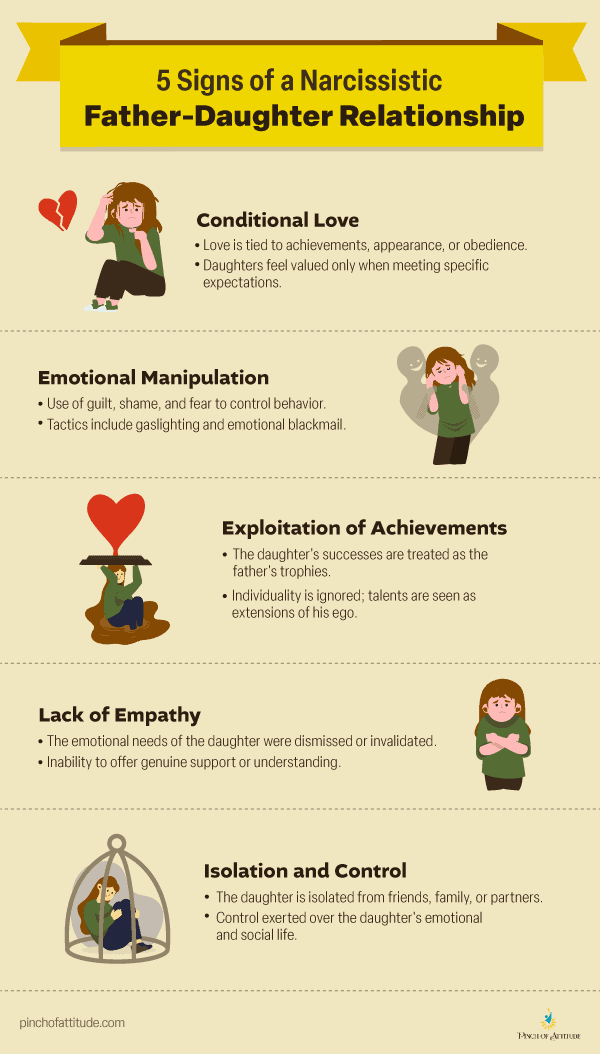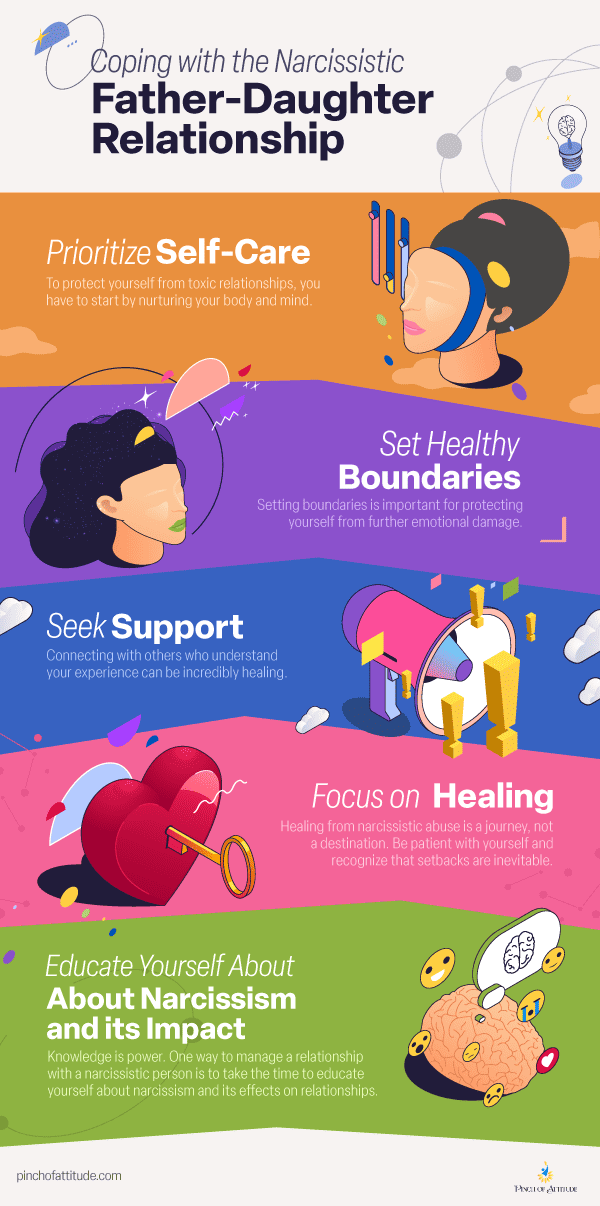Do you feel like you’re living in the shadow of a spotlight? Like your dad’s achievements are your only applause?
I get it. I was raised by a narcissistic mother, who made sure I was the supporting act. I even spent years chasing her approval.
But guess what? Turns out, children of narcissistic parents aren’t doomed to be dimmers.
I did it, and I know you can also break free from the toxicity of your narcissistic father-and-daughter dynamics and rewrite your narrative.
It was a rocky mountain of therapy sessions, self-help books with titles longer than my patience, and moments where I questioned my sanity (thanks, gaslighting!).
But every tear, every “why me?” whispered into the dark, brought me closer to healing.
And in sharing my journey to healing my inner child, I hope I could help you break the curse, too.
- Your narcissist father’s words don’t define you. His criticism is a reflection of his own flaws, not your worth. Believe in your strength and resilience.
- Daughters of narcissistic fathers share a unique pain, but there’s a whole community ready to support you.
- Healing is your journey, not his. His toxic behavior shaped your past, but you get to write the future. Embrace your resilience and build a life filled with healthy connections.
Table of Contents
What’s It Like to Be a Daughter of a Narcissistic Father?
Being a daughter of a narcissistic father can be incredibly challenging and emotionally draining. Personally, it often feels like a constant struggle for validation, love, and attention.
Growing up, I saw that my cousins were always trying to meet his unrealistic expectations and seeking his approval, which often they felt unattainable.
Does your father constantly make you feel unheard? Does it look like he enjoys showering you with unjust criticisms?
Daughters raised by a narcissistic father may feel like she’s living in a funhouse of emotions.
While Dad may charm the world with his wit, the story changes within family walls.
His narcissistic behavior becomes the soundtrack of your life. And you learn to walk on eggshells, anticipating his moods and prioritizing his fragile ego over your own needs.
Over time, this constant emotional tightrope walk takes a toll.
Feeling like your worth hinges on the ever-shifting approval of your narcissistic family member can lead to anxiety, depression, and low self-esteem.
You might struggle with self-doubt, questioning your choices, and constantly seeking validation.
But while these are common symptoms of daughters of narcissistic parents, they’re not your destiny. His narcissistic behavior is a reflection of him, not you.
Take my cousins, for example.
Their narcissistic father, who abandoned them to build a new family, resurfaced when my cousins, raised by the unwavering strength of my aunt, achieved success.
He had the audacity to feel entitled to their accomplishments, the fruits of years of single-handedly navigating life’s storms.
But they didn’t crumble.
They faced him with the strength forged in their struggles, rejecting his claims and protecting their hard-earned happiness.
That, in my opinion, is the true power of daughters who rise above the shadows of narcissism.
We learn resilience, independence, and an unwavering sense of self amidst the chaos.
We emerge stronger, more compassionate, and ready to build our own families, free from the toxicity of our past.
5 Signs of a Narcissistic Father and Daughter Relationship

The emotional rollercoaster of living with a narcissistic father can leave you questioning the very fabric of your reality.
But recognizing these toxic patterns is the first step towards setting healthy boundaries and reclaiming your life.
Here are the five most common markers of a toxic relationship between narcissistic fathers and their daughters:
- Conditional love: A narcissistic father’s love is often tied to achievement, appearance, or obedience. You may feel loved only when you fulfill his expectations, leading to a constant pressure to “perform” and a deep fear that your Dad will abandon you if you “fail.”
- Emotional manipulation: Guilt, shame, and fear are a narcissist dad’s tools of control. He may use emotional blackmail, gaslighting, or even rage to manipulate your behavior and keep you emotionally dependent.
- Exploitation of talents and achievements: He treats your successes as trophies for his shelf, evidence of his “superior parenting.” Your individuality and aspirations are ignored, and your talents are seen as extensions of his own ego.
- Lack of empathy and support: Your emotional needs are dismissed or invalidated. He may be incapable of offering genuine support or understanding, leaving you feeling isolated and emotionally neglected.
- Isolation and control: He may try to isolate you from other family members, friends, or potential romantic partners, further tightening his grip on your emotional and social life. This isolation fuels his control and weakens your support network.
That said, note that these are just some of the traits that can define a narcissistic father-daughter relationship.
They don’t mean your father has narcissistic personality disorder, but they do signify the presence of unhealthy dynamics and potential narcissistic abuse.
Why Do Daughters of Narcissistic Fathers Sabotage Themselves?
Adult daughters of narcissistic fathers often sabotage themselves because they’ve learned, often subconsciously, that it’s the safest way to exist within the dynamic of a narcissistic household.
Do you find it hard to maintain healthy relationships? Are you wondering why you seem to attract narcissistic partners? It could all be because of your Dad’s narcissism.
Let’s unpack that a bit.
Growing up with a narcissistic dad can feel like navigating a minefield of expectations and emotional manipulation.
To survive, it’s common among daughters of narcissistic fathers to adapt by internalizing their Dad’s high standards and striving for perfectionism in everything they do.
This constant pressure to excel, however, can lead to crippling self-doubt and a fear of failure.
Any perceived misstep can feel like a personal attack, triggering self-sabotage as a way to avoid the potential blowback from their father.
This self-sabotage can manifest in many ways, from subconsciously choosing career paths with high failure rates to withdrawing from relationships or opportunities for fear of not being “good enough.”
It’s a sad irony that the daughters of men who prioritize their own needs above all else often end up neglecting their own well-being in an attempt to please them.

How Do Narcissistic Fathers Treat Their Daughters?
The self-sabotage daughters of narcissistic fathers experience often stems directly from the emotionally damaging treatment they faced growing up in a narcissistic household.
While narcissistic individuals exhibit a wide range of behaviors, certain patterns tend to be experienced by daughters with alarming consistency.
Here are specific ways narcissistic fathers treat their daughters and how these experiences can shape their self-perception and behavior:
Manipulation
As mentioned, a narcissistic father often wields emotional manipulation as a tool to control their daughters.
They might use guilt trips, gaslighting, or even threats to keep their daughters compliant and dependent.
This constant pressure to conform to their expectations can lead to a deep-seated fear of disapproval and a tendency to prioritize their father’s needs over their own.

Lack of Empathy
A daughter of a narcissistic parent may describe a profound lack of empathy from their parent.
Their emotional needs are dismissed or invalidated, leaving them feeling isolated and unsupported.
This absence of emotional connection can lead to self-doubt, low self-esteem, and difficulty maintaining relationships.
Favoritism and Competition
Narcissistic fathers are prone to playing favorites, so daughters might experience favoritism towards siblings or even other family members.
This may create a sense of competition and insecurity, as daughters strive to earn their father’s approval and attention.
This dynamic can lead to self-sabotage as daughters subconsciously try to “shrink” themselves to avoid conflict or competition.
My own story resonates with this. You see, growing up with a narcissistic mom, I was labeled as the family’s black sheep.
I was the quirky, independent one, the one who marched to the beat of a different drum, while my siblings, well, they were the golden children, draped in Mom’s approval like a shimmering cloak.
The comparisons, the subtle put-downs, the feeling like I was forever vying for attention – it chipped away at my confidence like a sculptor with a chisel.
I spent years trying to shrink myself, to fit into the mold of what I thought my mom wanted, hoping to finally earn a sliver of her favor.
But here’s what I’ve learned: being the black sheep in a narcissistic family isn’t a curse, it’s my superpower.
It means I can march to my beat, and hold onto my individuality even when it feels like the world is trying to smother it.
And trust me, that inner strength is something no amount of favoritism can buy.
Constant Criticism
Daughters of narcissistic fathers are often subjected to relentless criticism, both overt and subtle. Their achievements are minimized, and their failures magnified.
This constant negativity can chip away at their self-confidence and lead to a belief that they are “never good enough.”
This, in turn, can fuel self-sabotage as daughters pre-emptively “fail” to avoid the sting of their father’s disapproval.
But here’s the thing: his words are a reflection of his warped reality, not your worth.
He may belittle your accomplishments and magnify your flaws, but that doesn’t mean they’re true.
Let his words fall away like rain on a rock, leaving you unshaken and resilient. You are more than enough, just as you are.
Enmeshment and Emotional Incest
Some narcissistic fathers exhibit unhealthy enmeshment with their daughters, blurring emotional boundaries and demanding excessive emotional dependence.
This can lead to some daughters feeling suffocated and unable to develop a healthy sense of self.
In extreme cases, it can even border on emotional incest, creating further emotional trauma and confusion.
The constant pressure to fulfill his emotional needs while neglecting your own can leave you feeling suffocated, lost, and unsure of where your identity ends and begins.
But remember, you deserve to have boundaries and a balanced emotional life.
How Are Daughters Affected by a Narcissistic Father?
Recognizing the ways your father’s narcissism manifests in his treatment can be a powerful step toward healing. But understanding the broader impact on you as his daughter is equally important.
The effects of growing up with a parent with narcissistic tendencies reach far beyond specific incidents. They weave deep threads into your psychological, emotional, and social fabric.
Psychological Effects
- Low self-esteem: The belief that you’re “not good enough” can become a heavy cloak, potentially leading to anxiety, depression, and even borderline personality disorder (BPD) in some cases.
- Disturbed attachment styles: Growing up with a father incapable of genuine empathy can hinder your ability to form healthy attachments. Fear of rejection and difficulty trusting others are common struggles, potentially leading to codependent relationships in adulthood.
- Impaired emotional processing: Understanding and expressing your own emotions can be challenging when your father dismisses or invalidates them. This can manifest as emotional detachment, difficulty identifying your needs, and even outbursts of anger or sadness as emotions build up unexpressed.
Emotional Effects
- Chronic anxiety and hypervigilance: Anticipating your father’s moods and outbursts at all times can create a constant state of anxiety and hypervigilance. You might find yourself overthinking situations, dreading conflict, and struggling to relax.
- Feelings of shame and guilt: You may internalize your father’s manipulative tactics, blaming yourself for his anger or unhappiness. This shame and guilt can be crippling, affecting your relationships and overall well-being.
- Isolation and difficulty trusting others: Witnessing your father’s lack of respect for boundaries and his manipulative treatment of others can make it difficult to trust people. You might withdraw socially, fearing further emotional hurt.
Social Effects
- Challenges in romantic relationships: The patterns learned in your relationship with your narcissistic father can unconsciously carry over into your own. You might attract emotionally unavailable partners or find yourself in controlling dynamics, repeating the cycle you grew up with.
- Difficulties maintaining boundaries: Setting and enforcing healthy boundaries can be a foreign concept if your father constantly disregards yours. This can lead to difficulty saying no, being taken advantage of, and struggling to assert your needs in personal and professional relationships.
- Impact on academic and professional success: The emotional turmoil and anxieties caused by a narcissistic father can affect your focus and motivation. You might struggle to concentrate, set goals, or achieve your full potential in academic or professional settings.
It’s important to remember that these effects are not inevitable. While a narcissistic father can cause significant damage, remember that healing is possible.
Recognizing the common symptoms that daughters of narcissistic fathers experience is the first step towards breaking free from the cycle.
Coping With the Narcissistic Father-Daughter Relationship

As a daughter of a narcissistic parent myself, I know firsthand the exhausting cycle of manipulation, emotional invalidation, and conditional love.
But remember, you’re not alone.
Many daughters of narcissistic fathers face the same things and manage to thrive despite the challenges.
Here are some strategies to deal with your relationship with your father and finally start recovering from narcissistic abuse:
Step 1: Prioritize Self-Care
To protect yourself from toxic relationships, you have to start by nurturing your body and mind. So, make self-care a non-negotiable priority.
Engage in activities that bring you joy and peace, whether it’s spending time in nature, practicing mindfulness, or indulging in a relaxing hobby.
For me, journaling became a lifeline. It was a safe space to pour out my frustrations, fears, and hopes without judgment.
Sports also became a powerful tool for self-care.
Immersing myself in physical activity not only boosted my mood and energy levels but also provided a healthy outlet for the anger and frustration that often bubbled beneath the surface.

Step 2: Set Healthy Boundaries
Setting boundaries is important for protecting yourself from further emotional damage.
This might involve limiting contact with your narcissistic father, asserting your needs clearly, and saying “no” to unreasonable demands.
You can rebuild a relationship with your father. But remember, you are not responsible for managing his emotions or fulfilling his unrealistic expectations.
Prioritize your own well-being and emotional safety.
Step 3: Seek Support
Connecting with others who understand your experience can be incredibly healing.
Consider joining a support group for daughters of narcissistic fathers or seeking therapy from someone who specializes in helping survivors of narcissistic abuse.
Sharing your burdens and learning from others who have walked a similar path can provide invaluable validation and support.
In my own experience with my narcissistic mother, what saved me was forging strong bonds outside the family circle.
Reconnecting with my cousins, who had similar experiences with our family, creating a sense of shared history and a feeling of belonging.
As for my close friends who had witnessed the dynamics firsthand, they gave me unwavering support and understanding.
Most important of all, my husband became my rock, a safe harbor where I could be myself without judgment or manipulation.
Step 4: Focus on Healing
Healing from narcissistic abuse is a journey, not a destination. Be patient with yourself and recognize that setbacks are inevitable.
Invest in therapy, practice self-compassion, and work on rebuilding your self-esteem. You deserve to heal and flourish in healthier relationships in your life.
In my own experience, growing up with a narcissistic mother honed my sensitivity to others’ emotions, making me a natural empath.
This innate ability, once overshadowed by the chaos of my childhood, became a beacon of strength. Today, I channel it into helping daughters of narcissistic fathers like yourself.
Sharing my story online, whether through blog posts, social media communities, or even one-on-one conversations, has become a form of catharsis and a way to extend a hand to others walking a similar path.
Step 5: Educate Yourself About Narcissism and Its Impact
Knowledge is power. One way to manage a relationship with a narcissistic person is to take the time to educate yourself about narcissism and its effects on relationships.
Understanding your father’s behavior can help you detach from his manipulations and respond with greater clarity and emotional security.
Related Posts:
- 10 Symptoms of Daughters of Narcissistic Fathers and The Impact That Had On Me
- 15 Traits of Daughters of Narcissistic Fathers You Should Be Awared Of
- How to Deal With a Narcissistic Father as a Daughter & How I Won Over the Trauma
- What Happens to Daughters of Narcissistic Fathers? You Are Not Alone
- 13 Reasons Why a Narcissistic Father Abandons His Daughter: It’s Not You
Frequently Asked Questions
Do narcissistic fathers love their daughters?
Narcissistic fathers may struggle to provide genuine love. Instead, their affection often hinges on the daughter meeting their expectations or serving their ego.
How do narcissistic fathers impact daughters’ romantic relationships?
Narcissistic fathers can impact their daughters and their intimate relationships by fostering codependency, trust issues, and a tendency to attract similar traits.
What do narcissistic fathers do to their daughters?
Daughters may experience gaslighting and manipulation from a narcissistic father. This can cause self-doubt, low self-esteem, and challenges in forming relationships.
How do daughters of narcissistic fathers act?
A daughter of a narcissist may exhibit people-pleasing behaviors, seek validation, struggle with boundaries, and face challenges in self-worth and relationships.
Is it possible for daughters of narcissistic fathers to have healthy relationships in the future?
Daughters of narcissistic fathers may have healthier relationships in the future with the help of therapy, self-awareness, and support.


